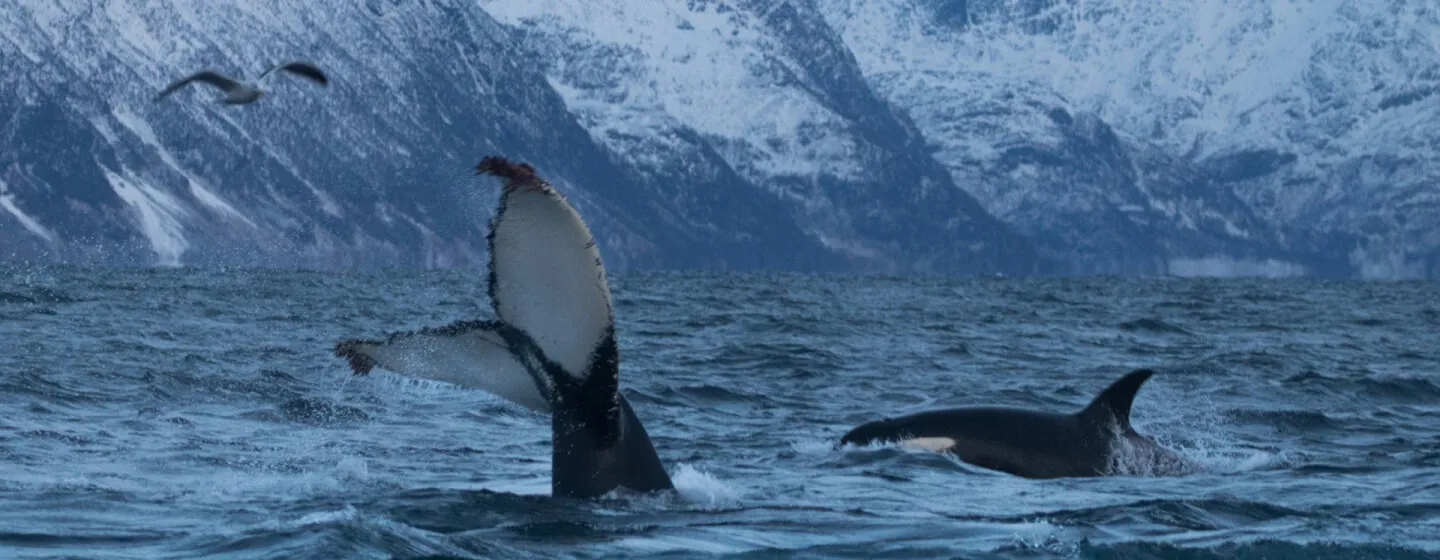Urban experiences meets raw Arctic nature
In-water activities with whale
In-water activities with whales is discouraged. Please have a look at our additional information for diving/snorkelling with whales in the Tromsø Region.
Risks associated with feeding situations
Entering the water in the presence of whales, especially those who are engaged in feeding, is a risky activity because the animals are focusing on feeding and might not be paying attention to the person(s).
In case of more whales feeding on the same fish bank there might be additional danger due to inter-individual competition for the prey. This competition increases with the presence of different species of whales. The problem here is having the knowledge and experience necessary to understand the whales’ behaviour and assessing potential danger for humans. For example, humpback whales lunge vertically in groups during bubble-net feeding as well as through orca carousel feeding. Persons in the water during these events are at risk of collision with fast-moving whales.
Entering the water in the vicinity of a feeding event might disrupt the activity of the whales. Distractions from feeding imply a reduction of the foraging efficiency and the ultimate fitness of the whale(s). Moreover, environmentally aware tourists might perceive this as a lack of respect towards the animals and the nature and spread negative comments about the specific operator.
Arctic environmental conditions
It is generally dangerous for humans to be in the water in this area during the winter because of environmental conditions: cold water, reduced visibility and quickly changing weather. A diving school would be very careful in taking clients to the water, deep water, even in the absence of whales. This would happen only after checking the ability of the clients either through certification or direct training and in any case under close supervision by experienced personnel.
Conditions, including frequently low in-water visibility, are such that short in-water projects are often unlikely to be successful.
Risks from other vessels
Ships, boats and fishing gear represent an additional danger, regardless of the presence of whales. It has recently been observed that vessels don’t respect the mandatory slow-speed area from boats flying the “A”, blue and white diver flag. Swimming-with-whales boats have also been observed coming close to groups of whales and letting people in the water without considerations for their distance to other crafts. These are dangerous infractions of the rules of navigation.
Safety and insurance requirements
When people enter the water, the presence of a rescue diver is necessary - someone who can perform basic first aid and organise prompt evacuation.
Visit Tromsø-Region would like to highlight that there may be specific insurance requirements for carrying out this type of activity. It is the operator’s responsibility to familiarise themselves with any insurance obligations that may apply, both for the operator and for the guests who will be snorkelling or diving.
If a serious accident should occur there might be extremely dire consequences also in terms of image, for the specific operator, the destination and the whole industry and this should be evidently undesirable.
Impacts on broader whale-watching operations
In-water activities necessitate limiting to a couple of humans in the water at a time, which potentially reduces the commerciality of the activity relative to topside whale watching.
In-water activities necessitate restricting the number of boats per situation to 1 (versus 3 for topside viewers), which impacts the total number of boats able to peacefully observe situations.
The tendency of boats to intercept the path of moving whales, to make it easier for a person to see something in-water, constitutes a serious direct disturbance of the animals as well as a nuisance for other on-lookers.
Ensure a safe and responsible experience – read our whale watching guidelines here.
Guidelines developed by:
Acquarone, Mario
Chair of Council of the European Cetacean Society (www.europeancetaceansociety.eu/) and Researcher, Department of Arctic and Marine Biology, UiT The Arctic University of Norway
Baker, Russell
Behavioural Consultancy, FB: Learning From Whales
Bertella, Giovanna
Associate Professor, School of Business and Economics, UIT the Arctic University of Norway
